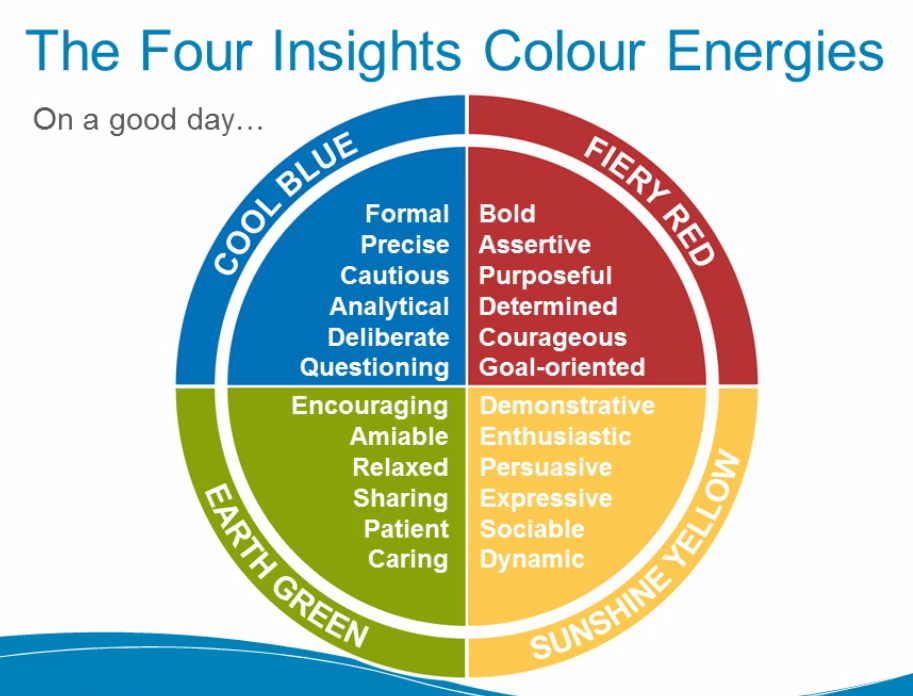Most are made up and silly.
The only one I’ve liked was in college I did a “communication style” one. Where it showed a bunch of different like emails, posts, and conversations and asked which you preferred to receive and which you were likely to write.

10 years later I still think about it, cause the goal of the work was to talk about how if you’re a certain communication style what to keep in mind with communicating with others. Like tips to not get frustrated with yellows who don’t care about facts when sending emails and how to write emails that don’t bore and frustrate people if you’re blue. (I’m blue green. I can sometimes write long emails)
I thought about it the other day cause a guy was complaining about all these emails that didn’t seem to say anything, they were just about feeling good, and he just wanted them to spit it out. Which corresponded to firey red getting mad at green.
So with that context, do you have any that actually had an impact on you?
The love language test in part because it was a great way to start a conversation about our romantic needs with my spouse.
Oh that makes a ton of sense!
Even if the categories are iffy, both people getting different results is probably enough to go “hey maybe we need to talk about what makes us feel loved”
I enjoy the D&D alignment chart.
I should’ve just said my result is “Chaotic Good” at that corporation “team-building” personality test workshop
Most typological approaches to personality are BS. Take Meyers Briggs as an example. If you are 51% extroverted, you are an extrovert, supposedly having more in common with someone who scored 100% on that same metric than an “introvert” who scored 49% on that metric.
MBTI most definitely takes magnitude into account. It’s bullshit for many other reasons, including not being reliably measurable.
Is anything in psychology reliably measurable?
Yes, very much so, many many things.
Well yes they are.
That’s why I was asking if any stood out to you as helpful.
Yeah I didn’t have an answer but wanted to contribute to the conversation lol
I must be pretty solidly into my categories on MB as while I agree it is BS, it was also alarmingly accurate for me.
The one that confirmed I should talk to a psychiatrist about a possible ADHD diagnosis.
The gold standard in personality tests is the NEO PI-R.
I’d recommend the book Me Myself and Us by Dr. Brian Little. Or even just search YouTube for lectures he’s given.
All personallity tests are idiotic and unscientific.
I’ve heard the love language test is pretty decent
MBTI is astrology for people who think they’re too smart for astrology
Official Hogwarts House Sorting Quiz
Big 5 personality test
The Big 5 is the only “personality” test used in actual scientific studies, if I recall correctly.
I have done many.
“Helpful” needs to be defined. In my younger life it helped me to find out about my personality. Later it also helped to understand other people.
Sometimes these tests gave contradicting results, so I learned that these results can never be taken 100% literally. You have to decide what to take from it and what to leave.
MBTI was the first one that fully admitted this, and that book even explained how these things change when you get older. So I consider this the most helpful one.
The strongest one IMHO was the Enneagram. But also most hard to understand.
The most scary one (and in retrospect, the most funny one) was at Scientology. It helped me to understand what a bunch that is and how they can catch people.
Nope, they are all made up recruiting companies to try and justify their ridiculous fees.
Requiring personality tests is just admitting that you are socially incompetent.
I used to have a job that was really into the Core Value Index. I thought it was pretty awesome because their categories were really simple and there are only 4 so you can really wrap your head around the whole thing at once.
It’s not a full personality test, it’s more focused on trying to answer the question “How do you want ideas presented to you?” And. “How do you prefer to interpret ideas?” I found myself making meanful changes in how I worked with coworkers where I knew their results, which isn’t something anyone can manage with more complicated tests.
I really got a lot out of the Myres Briggs when I was younger. I know its not scientifically valid, and it’s stupid of folks take it too seriously, but it really helped young me understand that other people weren’t wrong/dumb/weird for approaching things differently. And it helped me understand some of the axis on which difference can lie in a helpful way.
I think in the post internet age people are very aware of different categories and identities, but growing up in the previous millenium it wasn’t something that we talked about much. The introvert / extrovert division is overblown and overly simplistic nowadays, but before people use to just criticise each other for being “too shy” or “too loud” like there was a “normal” way to be that everyone should get.
The big five is certainly more reliable and scientifically supported, but I never found that it helped me understand a coworker or friend better. Partly I think conscientiousness and neuroticism sound a little too value laden. People can happily self describe as “detail orientated” (Sensing) or “big picture types” (Intuitive) but nobody really wants to say “I’m closed-off and unconscientious”. And I think that’s why MB has been popular in business / organisation worlds, because it’s a useful way to get people discussing themselves and how they approach problems. It doesn’t matter that in reality my level of extraversion varies depending on the context, or I’m Judging in certain tasks but Perceiving in others.
Probably an attachment style test. Attachment theory is empirically valid, and knowing your attachment style can help you understand relationship patterns: communication, behaviors, emotional needs, etc.
After that, the love languages are a good start to a conversation. Essentially they can help you figure out how you prefer to be cared for, and how you tend to show that you care. The categories themselves are arbitrary, and they’re based on observations by a baptist minister who offered relationship counseling. He’s not a licensed mental health professional, and the love languages aren’t empirically based. One issue I have with his book is that he claims that men tend to have “physical touch” as their love language, and that women should have more sex with their husbands to help them feel loved.
The Big Five personality traits are the most valid of the popular personality tests, but I didn’t feel like they helped me understand myself more.
I’ve set up a few of them, but helpful ones by other people are scarce. Personality tests are constructed based on principles of litmus-style generalization and me and what I’m doing them for tend to slip through the cracks. I’ve taken many for instance to see what my political alignment is and it’s always inconclusive since they think in black and white, assuming it’s not outright wrong because they want recruits. I’m likewise credited with “sorting systems” which themselves work but perhaps because they’re not there to shoehorn distinguishing absolute borders between people.
When these 2 books are combined, they can be profoundly helpful:
https://www.amazon.com/Modern-Enneagram-Discover-Who-You/dp/1939754070/
https://www.amazon.com/Take-Care-Your-Type-Enneagram-ebook/dp/B084VVB64H/
It’s the 2nd book which is the most-convincing ( because the improbable-recommendations it makes are sooo damn right, based on my last half-century of experience ),
but without the 1st book, the 2nd book has much less traction in one’s understanding.
2 books on one’s life-process-lopsidedness which can be equally-profound, are
https://www.amazon.com/Ayurvedic-Healing-Comprehensive-David-Frawley-ebook/dp/B003TO5EF0/
( do the ingredients-list experiment:
find your metabolism/“dosha”, & identify which set of ingredients would be most-harmful for you vs which would be most-pacifying for your health, & make a meal where each course is a pair of dishes, 1 maximally-aggravating, the other maximally-pacifying, & see which your own body prefers…
Mindblowingly eye-opening, that.
All the meals I’d eaten, before, had been a mixture of harming-my-health AND healing-me foods, an insane “strategy” that hadn’t been working!
Now, however, for all the years since I did the experiment, my health has been subtler & better a harmony.
Let the experiment-evidence decide for you, if your metabolism is one of the fundamental-metabolisms: then it should be clear-as-day. )
and
https://www.amazon.com/gp/aw/d/B0028UBEVO/
Again, both books are required for proper understanding.
The Yoga book shows you the kind of way you work-with your metabolism/“dosha”.
The ingredients-list in the “Ayurvedic Healing” book is sooo fundamental to my health that I simply don’t go grocery shopping without it, anymore.
This book is on the life-STAGE archetypes, like shattered-by-trauma
( the pair of “cards” “The Lightning Struck Tower” and whatever the crab-sifting-memories-in-the-lake-of-memories while the “wolf” and the “dog” try to get one off one’s true-path through aversions or desires )
or having to disconnect from the outer world, in order to go deep within oneself to decide something important, re one’s lifepath ( the choice/love card, card-6, iirc )
https://www.amazon.com/Wisdom-Tarot-Elisabeth-Haich-ebook/dp/B0716CHXJQ/
That one book I’d recommend getting the physical book, however: the archetype-stage illustrations are not included in the ebook.
The difference between it and ALL the other “tarot” books I’ve ever encountered, are…
- the profound understanding in Haich
- the uncontaminated archetype, ONLY ONE archetype per state
- the interwoven symbolism really is significant.
I’m not saying to just become a believer in its symbolisms, but I definitely am saying that if you ever want to understand someone’s sentience-stage, their life-state, you need to understand the stuff in that little profound book, and if any sudden change happens to someone, then that little book can help them know what they’re needing to focus on, to continue living unbroken, un derailed.
It’s an important psychology grounding.
Kegan & Lahey’s “Immunity to Change” is on the 3 unconscious-mind development stages of adult human life, and how our unconscious-mind “fights off” growing-up/adapting, to protect dysfunction/inertia.
It’s also important-as-hell for our lives.
Especially nowadays.
Daniel Kahneman’s “Thinking Fast & Slow” is on the imprint-reaction mind, which I call Kahneman1, & the considered-reasoning mind, Kahneman2, and how Kahneman1 mind fights to prevent the considered-reasoning mind from having any say in anything it feels it “owns”.
All ideology/prejudice imprint-reaction, left, right, religious, political, ALL of it, takes advantage of Kahneman1 mind, to try to own populations, & through them, countries/worlds.
It is the single most-important psychology book in our whole world, right now.
Communist “proletariat dictatorship” & right-wing “populist dictatorship” are both the same thing, fundamentally:
highjacking of the world for factional-supremacism, through Kahneman1 mind’s mechanisms.
I stop here, as of the thousands of books I’ve dug into, those are the most important ones for profound understanding.




